University Marketing Implications Report: Uber Bike Scheme Analysis
VerifiedAdded on 2022/09/24
|9
|1834
|18
Report
AI Summary
This report provides a comprehensive analysis of the marketing implications of the Uber electric bike scheme in Melbourne, focusing on the context of the United Nations Sustainable Development Goals (UNSDGs). The analysis begins by identifying the relevant UNSDGs, specifically goals 7 and 11, which pertain to affordable and clean energy and sustainable cities and communities, respectively. The report then identifies key stakeholders, including the government, Uber, the public, and the media, and discusses their influence on the bike-sharing scheme's success. Potential marketing issues, such as vandalism and dumping, are explored, along with the impact of fines and strict regulations. The report proposes solutions, emphasizing the importance of public education, agreements between local authorities and operators, and the implementation of geo-fencing to prevent unauthorized bike movement. The response to these issues includes the implementation of a customer service system and the support of local services for maintenance and repairs. The overall aim is to promote sustainable transport, reduce traffic congestion, and improve access to green spaces, aligning with broader social, environmental, and economic goals.
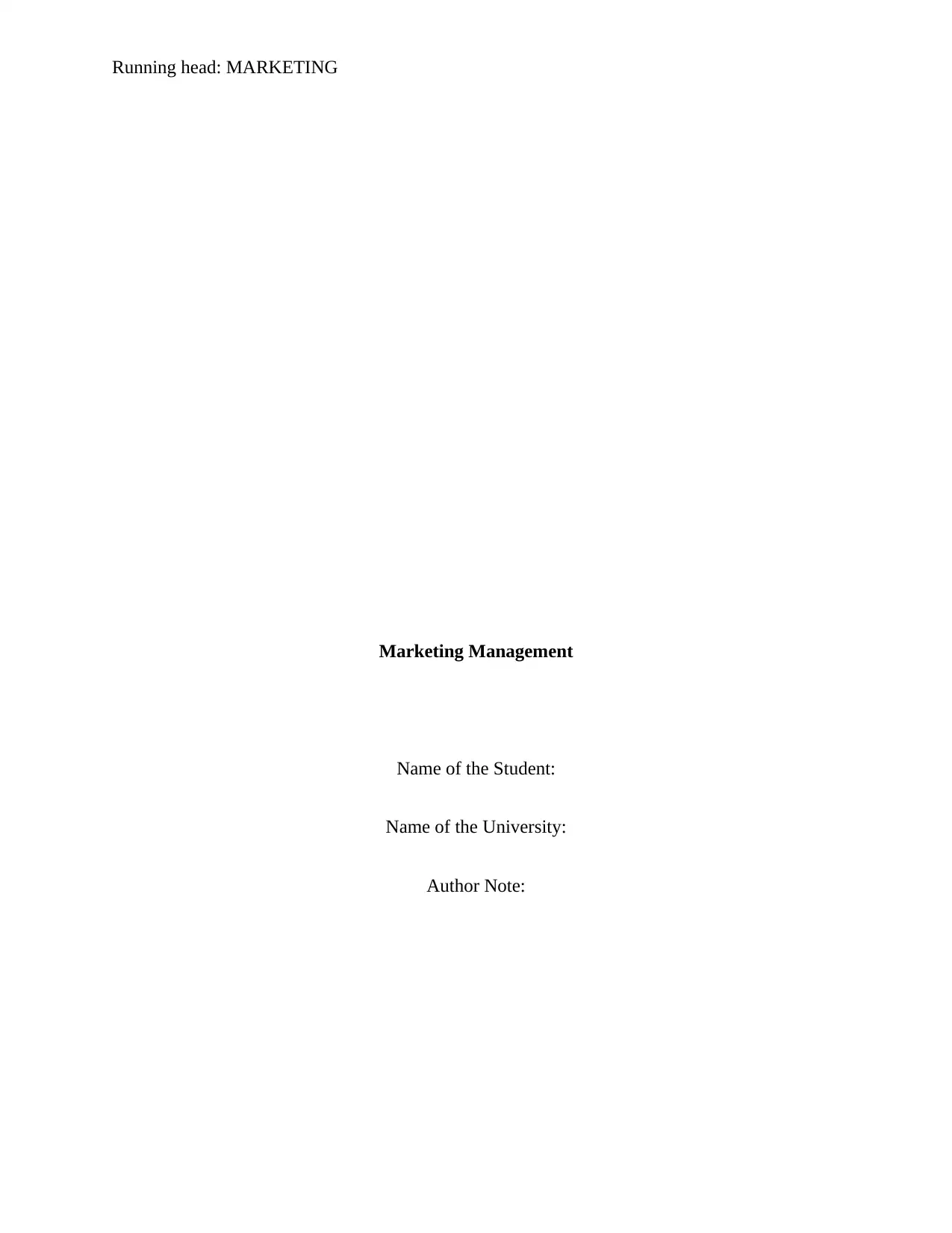
Running head: MARKETING
Marketing Management
Name of the Student:
Name of the University:
Author Note:
Marketing Management
Name of the Student:
Name of the University:
Author Note:
Paraphrase This Document
Need a fresh take? Get an instant paraphrase of this document with our AI Paraphraser
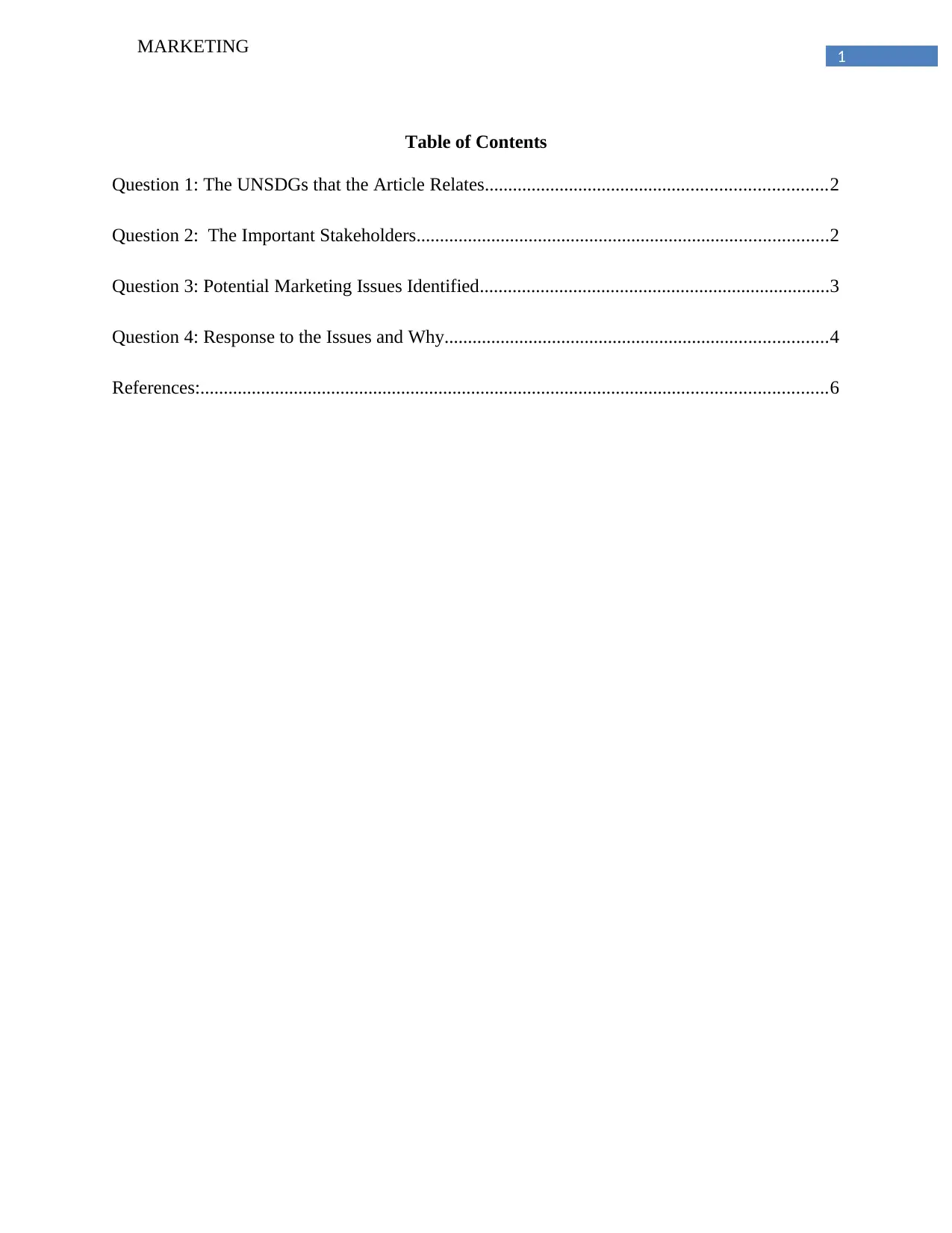
1
MARKETING
Table of Contents
Question 1: The UNSDGs that the Article Relates.........................................................................2
Question 2: The Important Stakeholders........................................................................................2
Question 3: Potential Marketing Issues Identified...........................................................................3
Question 4: Response to the Issues and Why..................................................................................4
References:......................................................................................................................................6
MARKETING
Table of Contents
Question 1: The UNSDGs that the Article Relates.........................................................................2
Question 2: The Important Stakeholders........................................................................................2
Question 3: Potential Marketing Issues Identified...........................................................................3
Question 4: Response to the Issues and Why..................................................................................4
References:......................................................................................................................................6
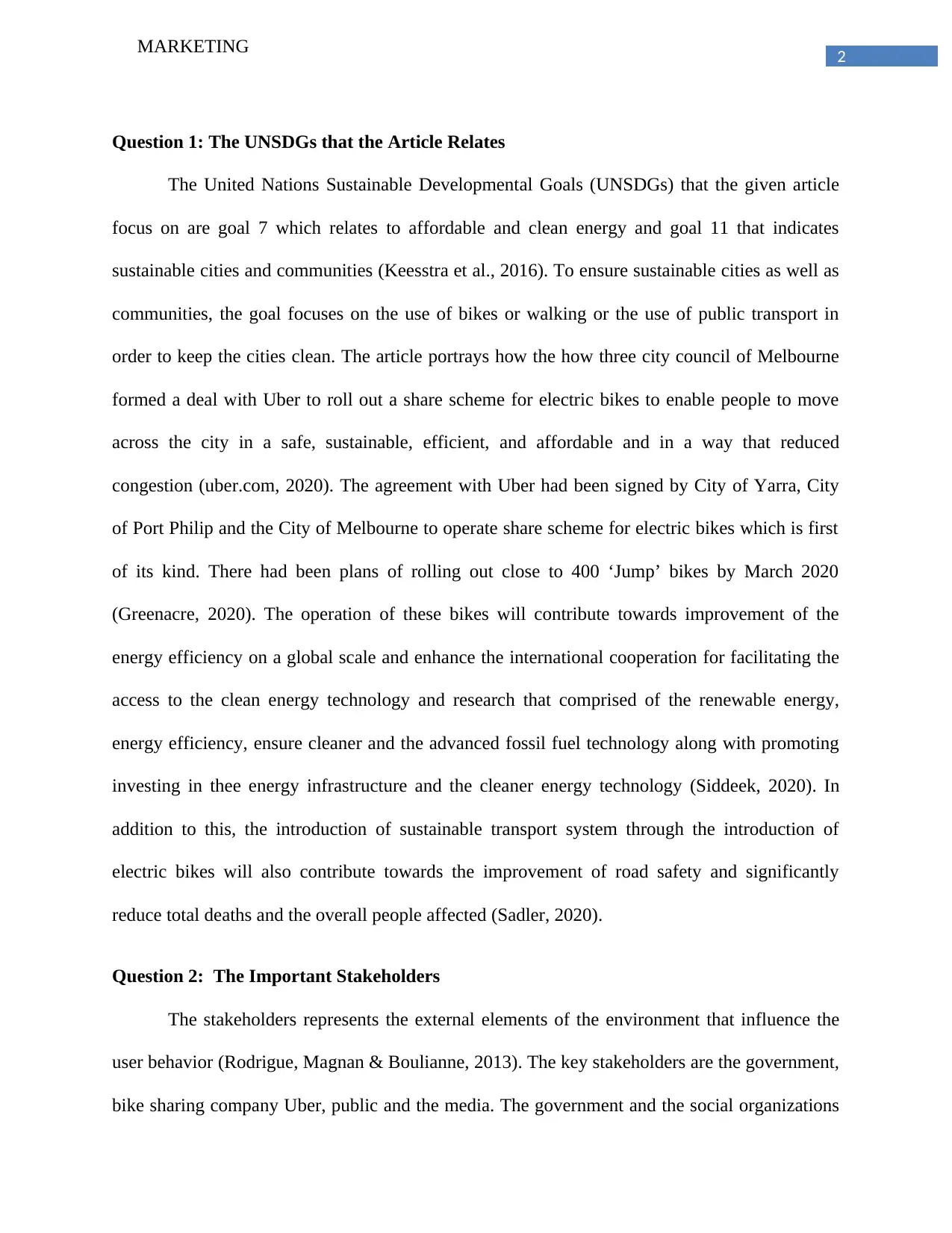
2
MARKETING
Question 1: The UNSDGs that the Article Relates
The United Nations Sustainable Developmental Goals (UNSDGs) that the given article
focus on are goal 7 which relates to affordable and clean energy and goal 11 that indicates
sustainable cities and communities (Keesstra et al., 2016). To ensure sustainable cities as well as
communities, the goal focuses on the use of bikes or walking or the use of public transport in
order to keep the cities clean. The article portrays how the how three city council of Melbourne
formed a deal with Uber to roll out a share scheme for electric bikes to enable people to move
across the city in a safe, sustainable, efficient, and affordable and in a way that reduced
congestion (uber.com, 2020). The agreement with Uber had been signed by City of Yarra, City
of Port Philip and the City of Melbourne to operate share scheme for electric bikes which is first
of its kind. There had been plans of rolling out close to 400 ‘Jump’ bikes by March 2020
(Greenacre, 2020). The operation of these bikes will contribute towards improvement of the
energy efficiency on a global scale and enhance the international cooperation for facilitating the
access to the clean energy technology and research that comprised of the renewable energy,
energy efficiency, ensure cleaner and the advanced fossil fuel technology along with promoting
investing in thee energy infrastructure and the cleaner energy technology (Siddeek, 2020). In
addition to this, the introduction of sustainable transport system through the introduction of
electric bikes will also contribute towards the improvement of road safety and significantly
reduce total deaths and the overall people affected (Sadler, 2020).
Question 2: The Important Stakeholders
The stakeholders represents the external elements of the environment that influence the
user behavior (Rodrigue, Magnan & Boulianne, 2013). The key stakeholders are the government,
bike sharing company Uber, public and the media. The government and the social organizations
MARKETING
Question 1: The UNSDGs that the Article Relates
The United Nations Sustainable Developmental Goals (UNSDGs) that the given article
focus on are goal 7 which relates to affordable and clean energy and goal 11 that indicates
sustainable cities and communities (Keesstra et al., 2016). To ensure sustainable cities as well as
communities, the goal focuses on the use of bikes or walking or the use of public transport in
order to keep the cities clean. The article portrays how the how three city council of Melbourne
formed a deal with Uber to roll out a share scheme for electric bikes to enable people to move
across the city in a safe, sustainable, efficient, and affordable and in a way that reduced
congestion (uber.com, 2020). The agreement with Uber had been signed by City of Yarra, City
of Port Philip and the City of Melbourne to operate share scheme for electric bikes which is first
of its kind. There had been plans of rolling out close to 400 ‘Jump’ bikes by March 2020
(Greenacre, 2020). The operation of these bikes will contribute towards improvement of the
energy efficiency on a global scale and enhance the international cooperation for facilitating the
access to the clean energy technology and research that comprised of the renewable energy,
energy efficiency, ensure cleaner and the advanced fossil fuel technology along with promoting
investing in thee energy infrastructure and the cleaner energy technology (Siddeek, 2020). In
addition to this, the introduction of sustainable transport system through the introduction of
electric bikes will also contribute towards the improvement of road safety and significantly
reduce total deaths and the overall people affected (Sadler, 2020).
Question 2: The Important Stakeholders
The stakeholders represents the external elements of the environment that influence the
user behavior (Rodrigue, Magnan & Boulianne, 2013). The key stakeholders are the government,
bike sharing company Uber, public and the media. The government and the social organizations
⊘ This is a preview!⊘
Do you want full access?
Subscribe today to unlock all pages.

Trusted by 1+ million students worldwide
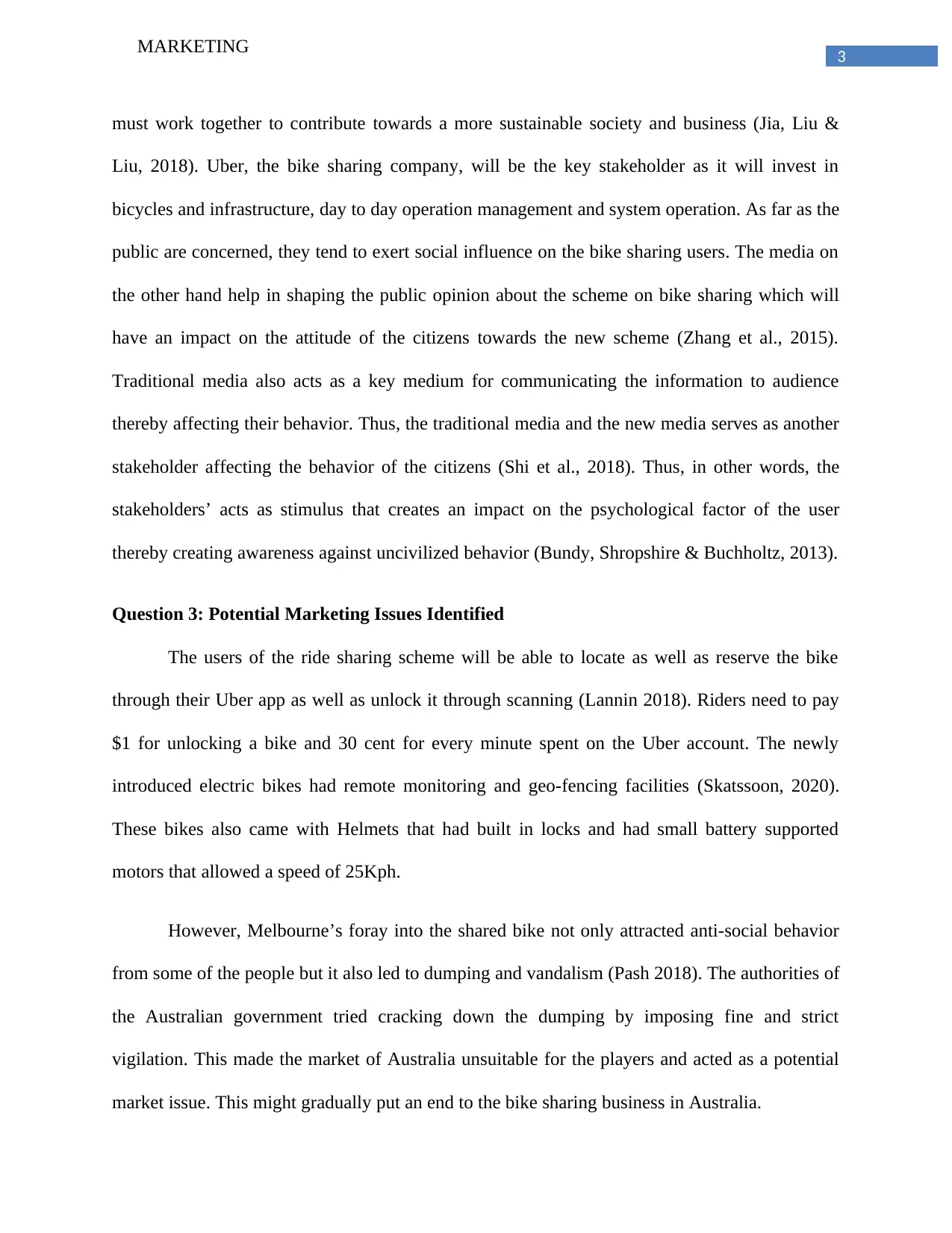
3
MARKETING
must work together to contribute towards a more sustainable society and business (Jia, Liu &
Liu, 2018). Uber, the bike sharing company, will be the key stakeholder as it will invest in
bicycles and infrastructure, day to day operation management and system operation. As far as the
public are concerned, they tend to exert social influence on the bike sharing users. The media on
the other hand help in shaping the public opinion about the scheme on bike sharing which will
have an impact on the attitude of the citizens towards the new scheme (Zhang et al., 2015).
Traditional media also acts as a key medium for communicating the information to audience
thereby affecting their behavior. Thus, the traditional media and the new media serves as another
stakeholder affecting the behavior of the citizens (Shi et al., 2018). Thus, in other words, the
stakeholders’ acts as stimulus that creates an impact on the psychological factor of the user
thereby creating awareness against uncivilized behavior (Bundy, Shropshire & Buchholtz, 2013).
Question 3: Potential Marketing Issues Identified
The users of the ride sharing scheme will be able to locate as well as reserve the bike
through their Uber app as well as unlock it through scanning (Lannin 2018). Riders need to pay
$1 for unlocking a bike and 30 cent for every minute spent on the Uber account. The newly
introduced electric bikes had remote monitoring and geo-fencing facilities (Skatssoon, 2020).
These bikes also came with Helmets that had built in locks and had small battery supported
motors that allowed a speed of 25Kph.
However, Melbourne’s foray into the shared bike not only attracted anti-social behavior
from some of the people but it also led to dumping and vandalism (Pash 2018). The authorities of
the Australian government tried cracking down the dumping by imposing fine and strict
vigilation. This made the market of Australia unsuitable for the players and acted as a potential
market issue. This might gradually put an end to the bike sharing business in Australia.
MARKETING
must work together to contribute towards a more sustainable society and business (Jia, Liu &
Liu, 2018). Uber, the bike sharing company, will be the key stakeholder as it will invest in
bicycles and infrastructure, day to day operation management and system operation. As far as the
public are concerned, they tend to exert social influence on the bike sharing users. The media on
the other hand help in shaping the public opinion about the scheme on bike sharing which will
have an impact on the attitude of the citizens towards the new scheme (Zhang et al., 2015).
Traditional media also acts as a key medium for communicating the information to audience
thereby affecting their behavior. Thus, the traditional media and the new media serves as another
stakeholder affecting the behavior of the citizens (Shi et al., 2018). Thus, in other words, the
stakeholders’ acts as stimulus that creates an impact on the psychological factor of the user
thereby creating awareness against uncivilized behavior (Bundy, Shropshire & Buchholtz, 2013).
Question 3: Potential Marketing Issues Identified
The users of the ride sharing scheme will be able to locate as well as reserve the bike
through their Uber app as well as unlock it through scanning (Lannin 2018). Riders need to pay
$1 for unlocking a bike and 30 cent for every minute spent on the Uber account. The newly
introduced electric bikes had remote monitoring and geo-fencing facilities (Skatssoon, 2020).
These bikes also came with Helmets that had built in locks and had small battery supported
motors that allowed a speed of 25Kph.
However, Melbourne’s foray into the shared bike not only attracted anti-social behavior
from some of the people but it also led to dumping and vandalism (Pash 2018). The authorities of
the Australian government tried cracking down the dumping by imposing fine and strict
vigilation. This made the market of Australia unsuitable for the players and acted as a potential
market issue. This might gradually put an end to the bike sharing business in Australia.
Paraphrase This Document
Need a fresh take? Get an instant paraphrase of this document with our AI Paraphraser
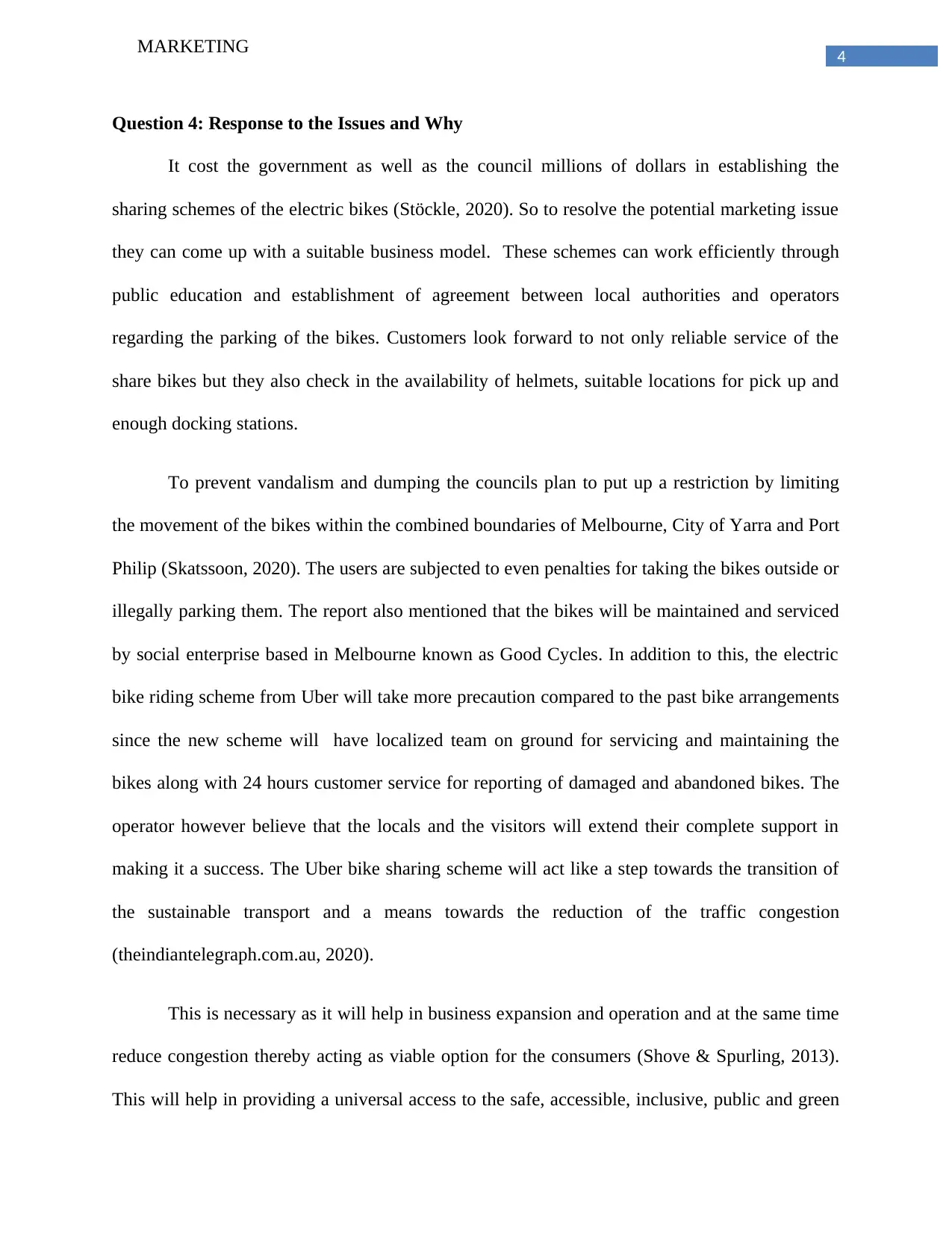
4
MARKETING
Question 4: Response to the Issues and Why
It cost the government as well as the council millions of dollars in establishing the
sharing schemes of the electric bikes (Stöckle, 2020). So to resolve the potential marketing issue
they can come up with a suitable business model. These schemes can work efficiently through
public education and establishment of agreement between local authorities and operators
regarding the parking of the bikes. Customers look forward to not only reliable service of the
share bikes but they also check in the availability of helmets, suitable locations for pick up and
enough docking stations.
To prevent vandalism and dumping the councils plan to put up a restriction by limiting
the movement of the bikes within the combined boundaries of Melbourne, City of Yarra and Port
Philip (Skatssoon, 2020). The users are subjected to even penalties for taking the bikes outside or
illegally parking them. The report also mentioned that the bikes will be maintained and serviced
by social enterprise based in Melbourne known as Good Cycles. In addition to this, the electric
bike riding scheme from Uber will take more precaution compared to the past bike arrangements
since the new scheme will have localized team on ground for servicing and maintaining the
bikes along with 24 hours customer service for reporting of damaged and abandoned bikes. The
operator however believe that the locals and the visitors will extend their complete support in
making it a success. The Uber bike sharing scheme will act like a step towards the transition of
the sustainable transport and a means towards the reduction of the traffic congestion
(theindiantelegraph.com.au, 2020).
This is necessary as it will help in business expansion and operation and at the same time
reduce congestion thereby acting as viable option for the consumers (Shove & Spurling, 2013).
This will help in providing a universal access to the safe, accessible, inclusive, public and green
MARKETING
Question 4: Response to the Issues and Why
It cost the government as well as the council millions of dollars in establishing the
sharing schemes of the electric bikes (Stöckle, 2020). So to resolve the potential marketing issue
they can come up with a suitable business model. These schemes can work efficiently through
public education and establishment of agreement between local authorities and operators
regarding the parking of the bikes. Customers look forward to not only reliable service of the
share bikes but they also check in the availability of helmets, suitable locations for pick up and
enough docking stations.
To prevent vandalism and dumping the councils plan to put up a restriction by limiting
the movement of the bikes within the combined boundaries of Melbourne, City of Yarra and Port
Philip (Skatssoon, 2020). The users are subjected to even penalties for taking the bikes outside or
illegally parking them. The report also mentioned that the bikes will be maintained and serviced
by social enterprise based in Melbourne known as Good Cycles. In addition to this, the electric
bike riding scheme from Uber will take more precaution compared to the past bike arrangements
since the new scheme will have localized team on ground for servicing and maintaining the
bikes along with 24 hours customer service for reporting of damaged and abandoned bikes. The
operator however believe that the locals and the visitors will extend their complete support in
making it a success. The Uber bike sharing scheme will act like a step towards the transition of
the sustainable transport and a means towards the reduction of the traffic congestion
(theindiantelegraph.com.au, 2020).
This is necessary as it will help in business expansion and operation and at the same time
reduce congestion thereby acting as viable option for the consumers (Shove & Spurling, 2013).
This will help in providing a universal access to the safe, accessible, inclusive, public and green
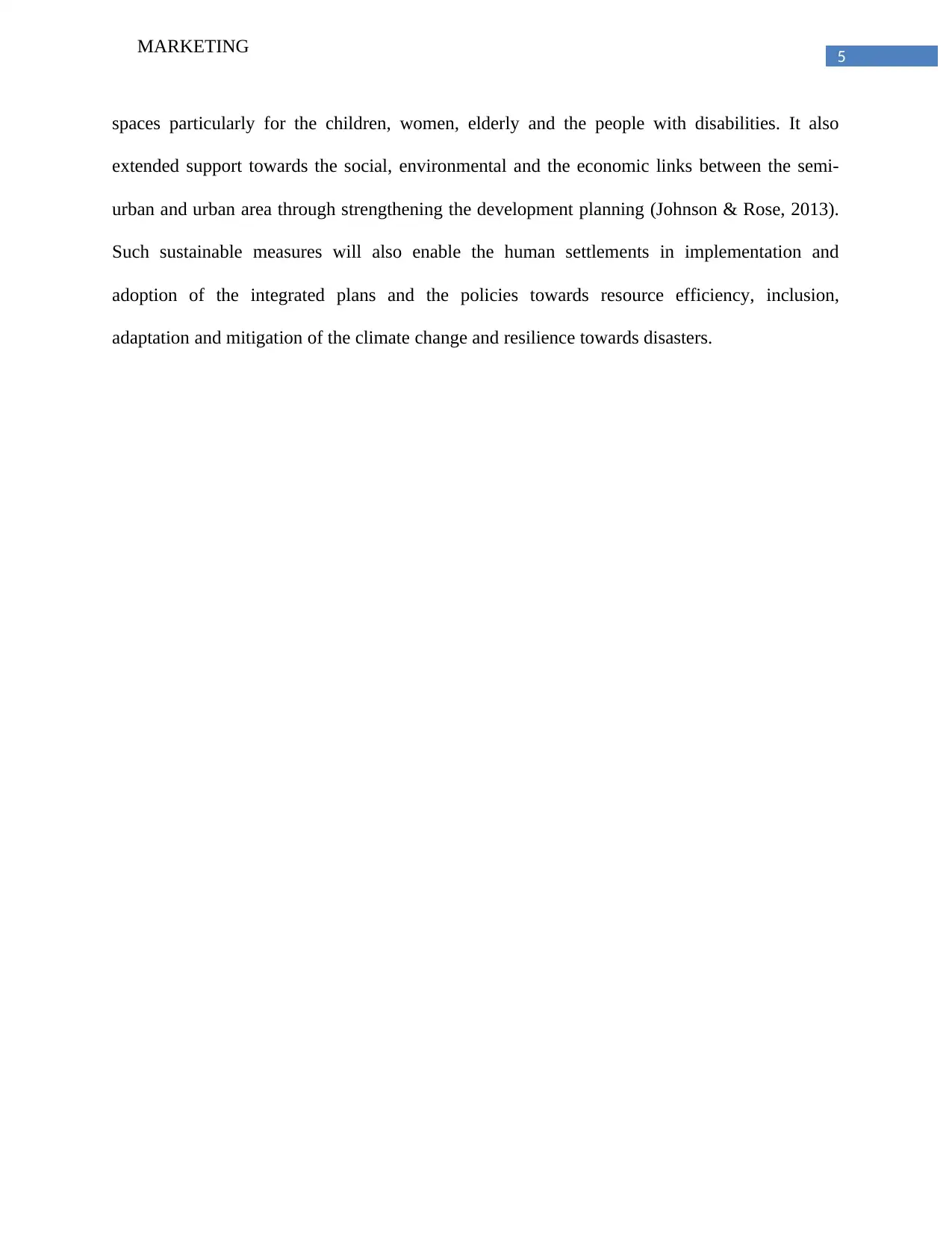
5
MARKETING
spaces particularly for the children, women, elderly and the people with disabilities. It also
extended support towards the social, environmental and the economic links between the semi-
urban and urban area through strengthening the development planning (Johnson & Rose, 2013).
Such sustainable measures will also enable the human settlements in implementation and
adoption of the integrated plans and the policies towards resource efficiency, inclusion,
adaptation and mitigation of the climate change and resilience towards disasters.
MARKETING
spaces particularly for the children, women, elderly and the people with disabilities. It also
extended support towards the social, environmental and the economic links between the semi-
urban and urban area through strengthening the development planning (Johnson & Rose, 2013).
Such sustainable measures will also enable the human settlements in implementation and
adoption of the integrated plans and the policies towards resource efficiency, inclusion,
adaptation and mitigation of the climate change and resilience towards disasters.
⊘ This is a preview!⊘
Do you want full access?
Subscribe today to unlock all pages.

Trusted by 1+ million students worldwide
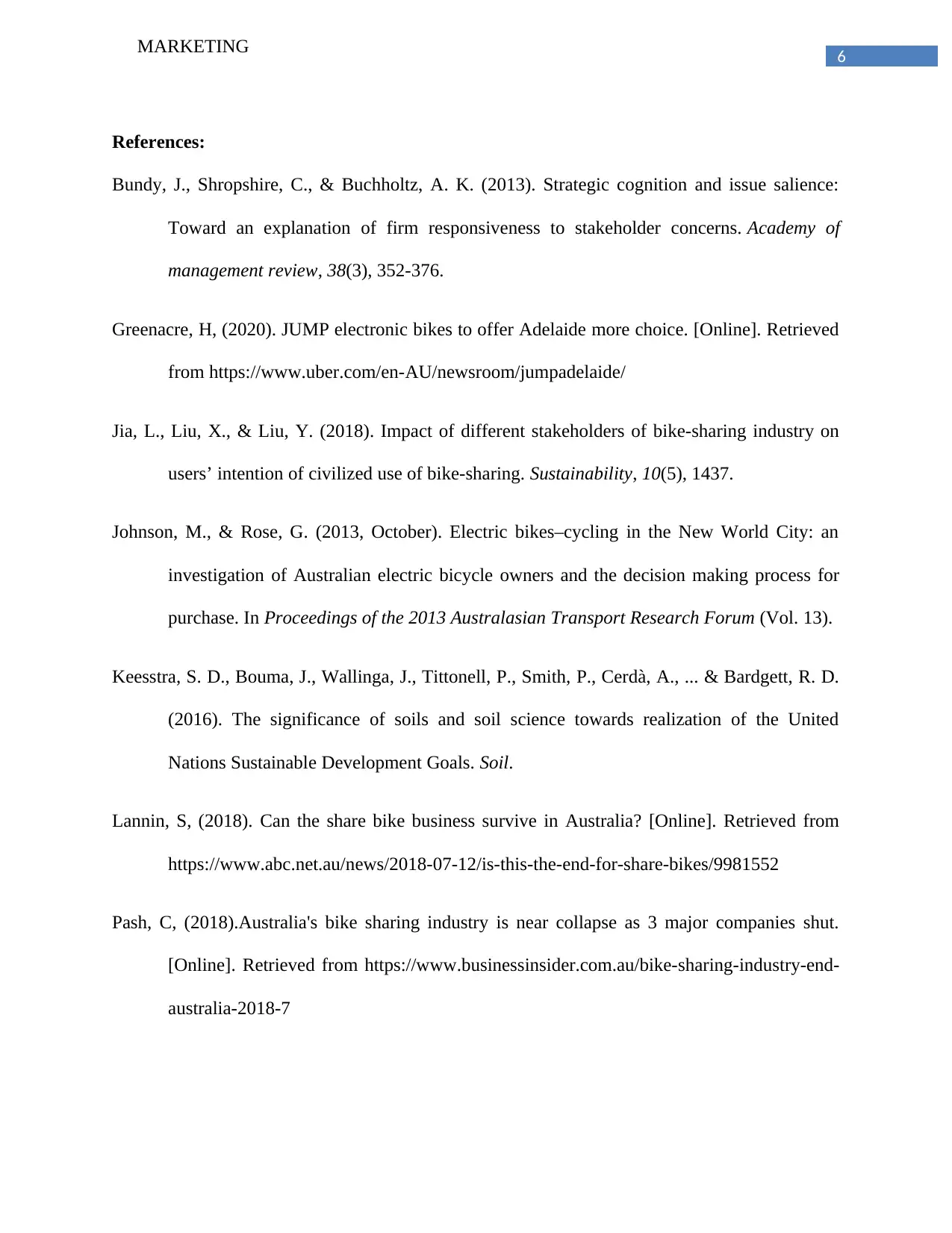
6
MARKETING
References:
Bundy, J., Shropshire, C., & Buchholtz, A. K. (2013). Strategic cognition and issue salience:
Toward an explanation of firm responsiveness to stakeholder concerns. Academy of
management review, 38(3), 352-376.
Greenacre, H, (2020). JUMP electronic bikes to offer Adelaide more choice. [Online]. Retrieved
from https://www.uber.com/en-AU/newsroom/jumpadelaide/
Jia, L., Liu, X., & Liu, Y. (2018). Impact of different stakeholders of bike-sharing industry on
users’ intention of civilized use of bike-sharing. Sustainability, 10(5), 1437.
Johnson, M., & Rose, G. (2013, October). Electric bikes–cycling in the New World City: an
investigation of Australian electric bicycle owners and the decision making process for
purchase. In Proceedings of the 2013 Australasian Transport Research Forum (Vol. 13).
Keesstra, S. D., Bouma, J., Wallinga, J., Tittonell, P., Smith, P., Cerdà, A., ... & Bardgett, R. D.
(2016). The significance of soils and soil science towards realization of the United
Nations Sustainable Development Goals. Soil.
Lannin, S, (2018). Can the share bike business survive in Australia? [Online]. Retrieved from
https://www.abc.net.au/news/2018-07-12/is-this-the-end-for-share-bikes/9981552
Pash, C, (2018).Australia's bike sharing industry is near collapse as 3 major companies shut.
[Online]. Retrieved from https://www.businessinsider.com.au/bike-sharing-industry-end-
australia-2018-7
MARKETING
References:
Bundy, J., Shropshire, C., & Buchholtz, A. K. (2013). Strategic cognition and issue salience:
Toward an explanation of firm responsiveness to stakeholder concerns. Academy of
management review, 38(3), 352-376.
Greenacre, H, (2020). JUMP electronic bikes to offer Adelaide more choice. [Online]. Retrieved
from https://www.uber.com/en-AU/newsroom/jumpadelaide/
Jia, L., Liu, X., & Liu, Y. (2018). Impact of different stakeholders of bike-sharing industry on
users’ intention of civilized use of bike-sharing. Sustainability, 10(5), 1437.
Johnson, M., & Rose, G. (2013, October). Electric bikes–cycling in the New World City: an
investigation of Australian electric bicycle owners and the decision making process for
purchase. In Proceedings of the 2013 Australasian Transport Research Forum (Vol. 13).
Keesstra, S. D., Bouma, J., Wallinga, J., Tittonell, P., Smith, P., Cerdà, A., ... & Bardgett, R. D.
(2016). The significance of soils and soil science towards realization of the United
Nations Sustainable Development Goals. Soil.
Lannin, S, (2018). Can the share bike business survive in Australia? [Online]. Retrieved from
https://www.abc.net.au/news/2018-07-12/is-this-the-end-for-share-bikes/9981552
Pash, C, (2018).Australia's bike sharing industry is near collapse as 3 major companies shut.
[Online]. Retrieved from https://www.businessinsider.com.au/bike-sharing-industry-end-
australia-2018-7
Paraphrase This Document
Need a fresh take? Get an instant paraphrase of this document with our AI Paraphraser
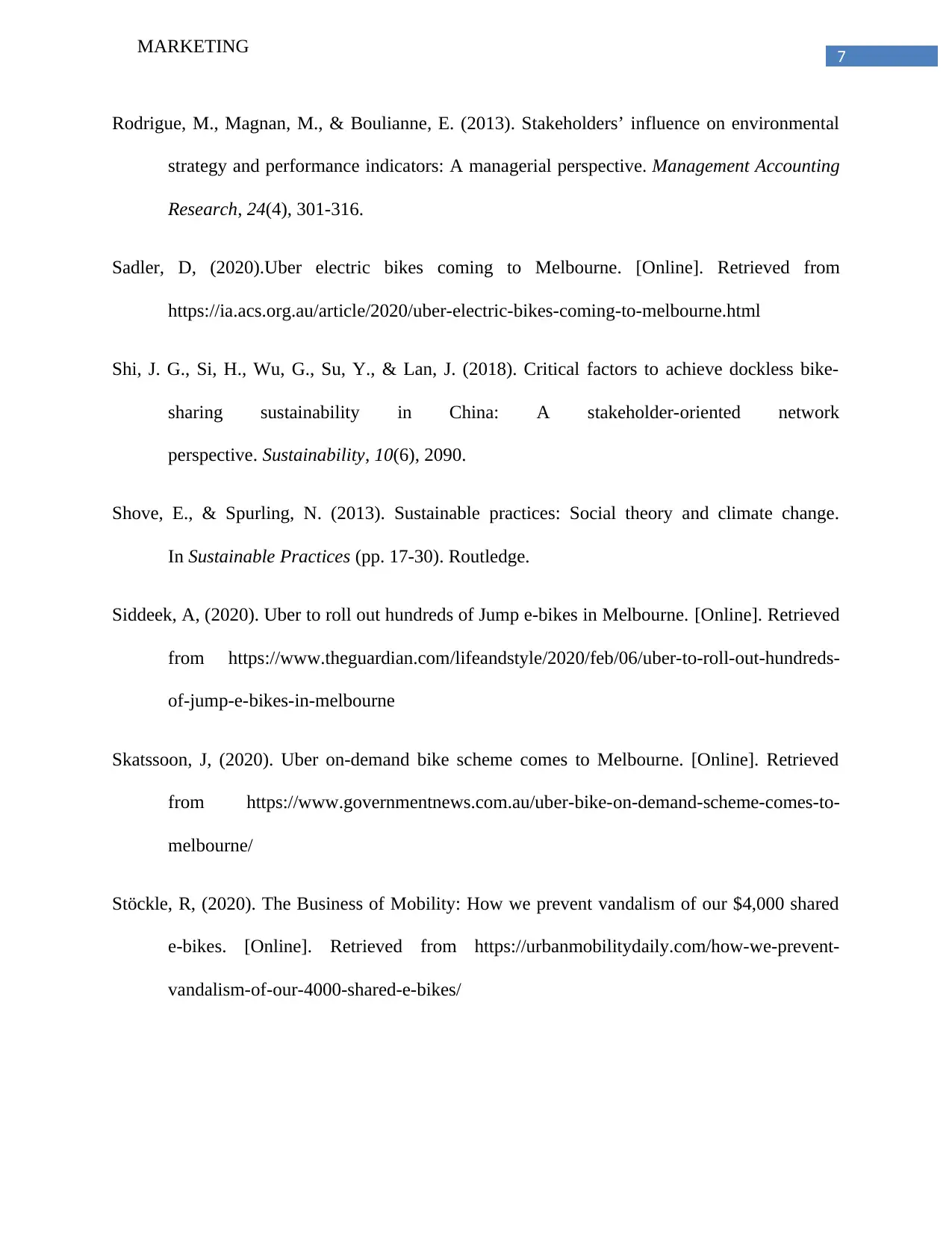
7
MARKETING
Rodrigue, M., Magnan, M., & Boulianne, E. (2013). Stakeholders’ influence on environmental
strategy and performance indicators: A managerial perspective. Management Accounting
Research, 24(4), 301-316.
Sadler, D, (2020).Uber electric bikes coming to Melbourne. [Online]. Retrieved from
https://ia.acs.org.au/article/2020/uber-electric-bikes-coming-to-melbourne.html
Shi, J. G., Si, H., Wu, G., Su, Y., & Lan, J. (2018). Critical factors to achieve dockless bike-
sharing sustainability in China: A stakeholder-oriented network
perspective. Sustainability, 10(6), 2090.
Shove, E., & Spurling, N. (2013). Sustainable practices: Social theory and climate change.
In Sustainable Practices (pp. 17-30). Routledge.
Siddeek, A, (2020). Uber to roll out hundreds of Jump e-bikes in Melbourne. [Online]. Retrieved
from https://www.theguardian.com/lifeandstyle/2020/feb/06/uber-to-roll-out-hundreds-
of-jump-e-bikes-in-melbourne
Skatssoon, J, (2020). Uber on-demand bike scheme comes to Melbourne. [Online]. Retrieved
from https://www.governmentnews.com.au/uber-bike-on-demand-scheme-comes-to-
melbourne/
Stöckle, R, (2020). The Business of Mobility: How we prevent vandalism of our $4,000 shared
e-bikes. [Online]. Retrieved from https://urbanmobilitydaily.com/how-we-prevent-
vandalism-of-our-4000-shared-e-bikes/
MARKETING
Rodrigue, M., Magnan, M., & Boulianne, E. (2013). Stakeholders’ influence on environmental
strategy and performance indicators: A managerial perspective. Management Accounting
Research, 24(4), 301-316.
Sadler, D, (2020).Uber electric bikes coming to Melbourne. [Online]. Retrieved from
https://ia.acs.org.au/article/2020/uber-electric-bikes-coming-to-melbourne.html
Shi, J. G., Si, H., Wu, G., Su, Y., & Lan, J. (2018). Critical factors to achieve dockless bike-
sharing sustainability in China: A stakeholder-oriented network
perspective. Sustainability, 10(6), 2090.
Shove, E., & Spurling, N. (2013). Sustainable practices: Social theory and climate change.
In Sustainable Practices (pp. 17-30). Routledge.
Siddeek, A, (2020). Uber to roll out hundreds of Jump e-bikes in Melbourne. [Online]. Retrieved
from https://www.theguardian.com/lifeandstyle/2020/feb/06/uber-to-roll-out-hundreds-
of-jump-e-bikes-in-melbourne
Skatssoon, J, (2020). Uber on-demand bike scheme comes to Melbourne. [Online]. Retrieved
from https://www.governmentnews.com.au/uber-bike-on-demand-scheme-comes-to-
melbourne/
Stöckle, R, (2020). The Business of Mobility: How we prevent vandalism of our $4,000 shared
e-bikes. [Online]. Retrieved from https://urbanmobilitydaily.com/how-we-prevent-
vandalism-of-our-4000-shared-e-bikes/
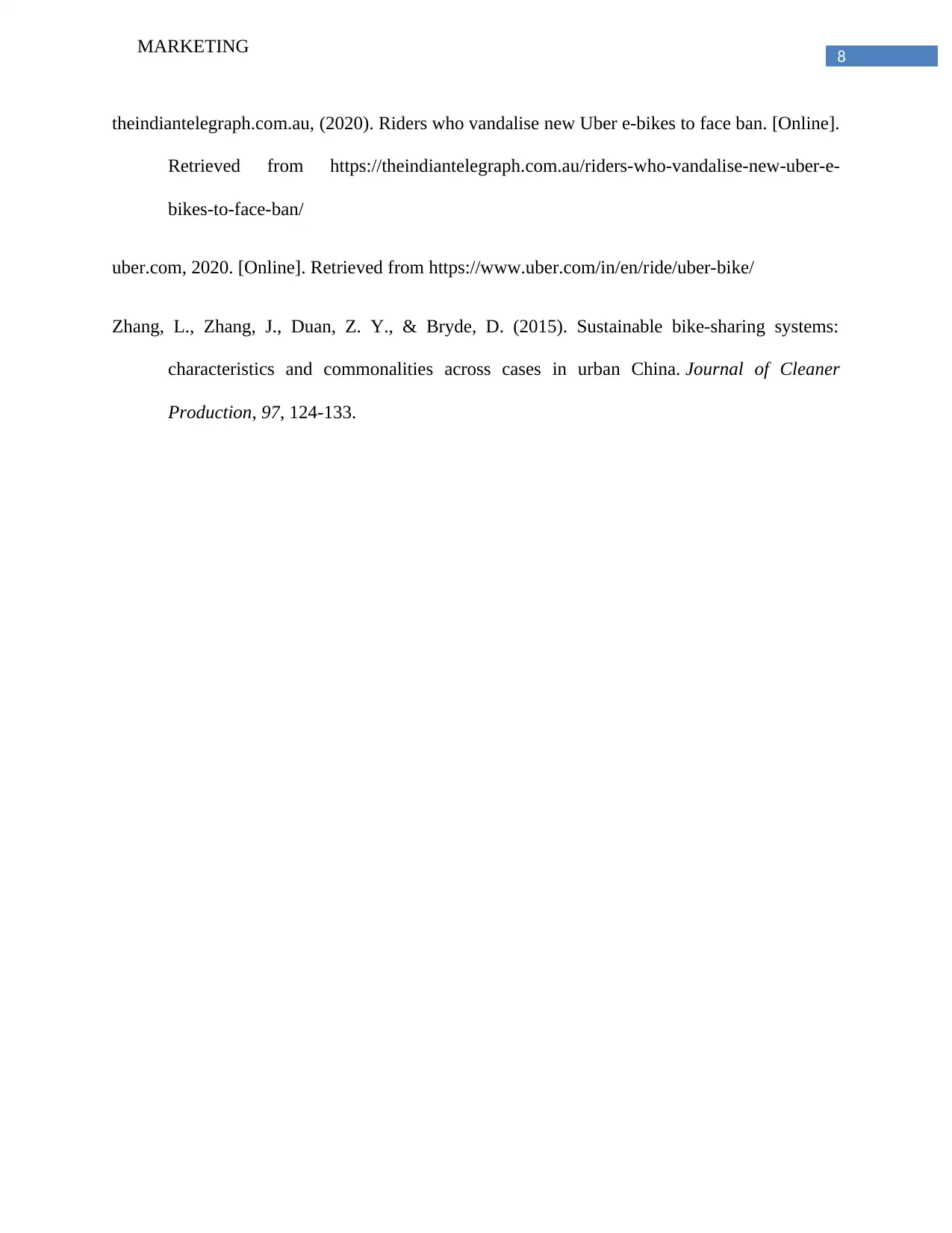
8
MARKETING
theindiantelegraph.com.au, (2020). Riders who vandalise new Uber e-bikes to face ban. [Online].
Retrieved from https://theindiantelegraph.com.au/riders-who-vandalise-new-uber-e-
bikes-to-face-ban/
uber.com, 2020. [Online]. Retrieved from https://www.uber.com/in/en/ride/uber-bike/
Zhang, L., Zhang, J., Duan, Z. Y., & Bryde, D. (2015). Sustainable bike-sharing systems:
characteristics and commonalities across cases in urban China. Journal of Cleaner
Production, 97, 124-133.
MARKETING
theindiantelegraph.com.au, (2020). Riders who vandalise new Uber e-bikes to face ban. [Online].
Retrieved from https://theindiantelegraph.com.au/riders-who-vandalise-new-uber-e-
bikes-to-face-ban/
uber.com, 2020. [Online]. Retrieved from https://www.uber.com/in/en/ride/uber-bike/
Zhang, L., Zhang, J., Duan, Z. Y., & Bryde, D. (2015). Sustainable bike-sharing systems:
characteristics and commonalities across cases in urban China. Journal of Cleaner
Production, 97, 124-133.
⊘ This is a preview!⊘
Do you want full access?
Subscribe today to unlock all pages.

Trusted by 1+ million students worldwide
1 out of 9
Your All-in-One AI-Powered Toolkit for Academic Success.
+13062052269
info@desklib.com
Available 24*7 on WhatsApp / Email
![[object Object]](/_next/static/media/star-bottom.7253800d.svg)
Unlock your academic potential
Copyright © 2020–2026 A2Z Services. All Rights Reserved. Developed and managed by ZUCOL.

